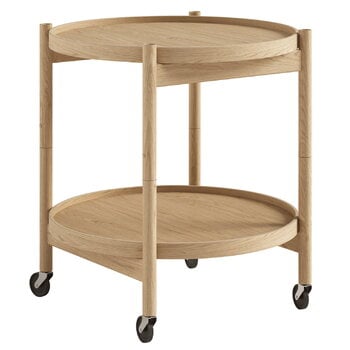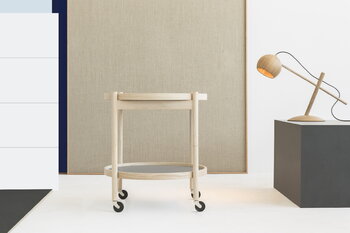Brdr. Krüger's Bølling tray table, designed by Hans Bølling, is a Danish design classic from 1963. The round trolley is a fine example of the playful functionalism typical of Danish design, allowing it to be used in a variety of settings and a variety of purposes: the tray table can be used, for example, as a bar cart or a side table in the living room or as a bedside table in the bedroom. The Bølling trolley is made in Denmark and is available in a number of shades and finishes.
Bølling tray table 50 cm, oiled oak - veneer
Brdr. Krüger
Description
Brdr. Krüger's Bølling tray table, designed by Hans Bølling, is a Danish design classic from 1963. The round trolley is a fine example of the playful functionalism typical of Danish design, allowing it to be used in a variety of settings and a variety of purposes: the tray table can be used, for example, as a bar cart or a side table in the living room or as a bedside table in the bedroom. The Bølling trolley is made in Denmark and is available in a number of shades and finishes.
Product details (5)
- Colour
- Oiled oak
- Height
- 55 cm
- Diameter
- 50 cm
- Material
- Oak, oak veneer
- Weight
- 5 kg
- Product ID
Designer
Hans Bølling (born 1931) is a Danish architect and designer. He first planned a career in advertising design, but ended up studying to become an architect. After graduating from the Royal Danish Art Academy, Bølling has designed small wooden objects, furniture, villas and town halls. His works are described as joyful and cheerful.
View all productsReviews (0)
Sustainability
The Product Sustainability Framework, our criteria of sustainable design, helps you find the most sustainable products in our selection. Read below which sustainability criteria this product has met.
Working conditions & labour 8/9
-
Equal opportunities for all employees
-
Commitment to UN Global Compact, fair compensation for all employees
-
Corporate responsibility requirements defined and communicated for suppliers
-
Systematic work for improved inclusion and well-being in the workplace
-
Transparent supply chain
-
Suppliers' compliance to a code of conduct ensured
-
Compliance to the UN Guiding Principles on Business and Human Rights ensured in the supply chain
-
Support for community involvement in the supply chain
-
Direct suppliers audited and certified
Eco-friendly production 9/9
-
Fair and resource-wise water-use in production
-
No incineration or landfilling of returned items
-
No use of endangered species as materials
-
No direct environmental emissions or waste (excl. GHGs) from production
-
The sustainability of direct suppliers' production is addressed and monitored
-
Production and material sourcing that respect biodiversity, animal rights, and natural ecosystems
-
Material-efficient and ecological packaging
-
Positive impact on nature’s well-being through operations that regenerate natural ecosystems
-
No potentially harmful chemicals used in own production
Climate impact 4/8
-
Company's direct greenhouse gas emissions identified and commitment to reduction
-
Product's carbon impact identified and commitment to reduction
-
Guidance on energy- and eco-efficient use of the product
-
Carbon neutral or carbon negative product
-
Contribution to climate initiatives beyond the brand’s direct operations
-
Low-carbon or compensated transportation
-
Carbon footprint of the product calculated and goals set to reduce it
-
100 % renewable energy in own production and operations
Sustainable materials 5/6
-
Sustainable and long-lasting material choices
-
No harmful or hazardous substances
-
Responsible raw material sourcing and production
-
Materials suited for circularity: monomaterials, recyclable finishings, renewable or recycled contents etc.
-
Ecological materials: natural, biodegradable, recyclable or recycled contents
-
Outstanding materials in terms of innovativeness, responsibility, sustainability and circularity: local production or sourcing, 100 % recycled content, C2C-certification etc.
Circular design 5/5
-
High aesthetic quality promoting long-term use of the product
-
Technically durable product design and material choices
-
Design for enduring life-long quality
-
Design and support for product maintenance, repair and upgradability
-
Innovative circular design solutions: circular service system, resale platform, remanufacturing, collection of used products, etc.







